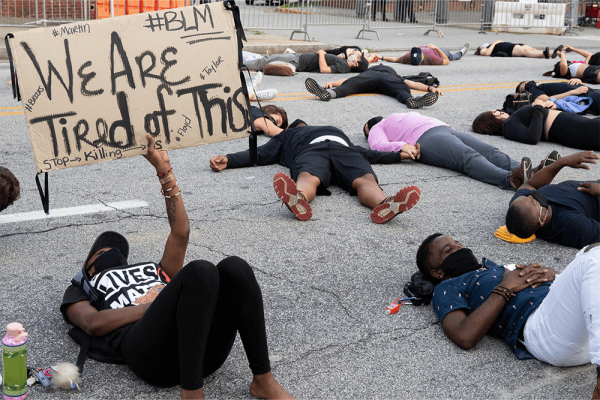Exhausted. That is the best way I can describe the state of my mind and spirit going into this past long weekend.
Exhausted by the rancor and division in our politics. Exhausted by so many within the GOP who remain captive to the politics of lies and grievance. Exhausted by many Democrats who underestimate the dire threats to our democracy and lack the will to suspend Senate rules to safeguard it. Exhausted at the steady stream of evidence from the January 6 hearings that former President Donald Trump and his allies tried to overturn the election, culminating in the violent attempted coup at the Capitol. Exhausted by another horrific mass shooting, this time in Highland Park, Ill., during an Independence Day parade. Exhausted by another brutal and senseless killing of a Black man, in this case by police in Akron, Ohio, who shot Jayland Walker an unconscionable 60 times.
And don’t even get me started on the Supreme Court, whose conservative justices issued a series of extreme and harmful rulings as they finished this term. Most notably, the court issued a deeply flawed and alarming ruling that overturned Roe v. Wade, ending nearly 50 years of judicial precedent protecting abortion rights; the impact of this ruling will disproportionately harm women of color.
The Supreme Court also struck down New York’s limits on concealed carry of guns, rendering many other gun safety laws across the country extremely vulnerable to legal challenge on Second Amendment grounds. The court ruled that a person who was not issued the standard Miranda warning when arrested and whose statements are used against them in criminal court may not sue the police officer who violated their rights. The court also issued rulings that made it more difficult for individuals to sue federal law enforcement officers for violations of their civil rights, infringed upon tribal sovereignty, and dealt a significant blow to the Environmental Protection Agency’s efforts to combat the climate crisis. Finally, the court announced it would hear a case that could potentially result in state legislators gaining significant power to gerrymander congressional districts and establish voting laws that could jeopardize the integrity of federal elections.
These decisions are sobering.
I know I’m not alone in feeling exhausted. In 2018, More In Common — a nonprofit that researches what’s driving political polarization — found that two-thirds of Americans share a series of characteristics that make them a part of what they call the “exhausted majority.” This group of people is “fed up with the polarization plaguing American government and society,” feels forgotten in the public discourse, and often has flexible views that don’t fit consistently in the Left/Right binary. Yet, they believe we can still find common ground. Sound familiar?
But here’s the problem: The exhausted majority isn’t being heard or represented in our current system, which is so often dominated by the most extreme voices. Combined with the growth of gerrymandered districts, our electoral system increasingly rewards the politics of division and extremism, the very behavior that fuels exhaustion. In 2021, Unite America — a coalition of Democrats, Republicans, and independents working to reform democracy — found that “despite a record turnout in the 2020 general election,” 83 percent of Congressional seats were determined in primary elections in which only 10 percent of eligible voters cast ballots. As the researchers at More In Common put it: “While partisans argue and score political points, members of the Exhausted Majority are so frustrated with the bitter polarization of our politics that many have checked out completely, ceding the floor to more strident voices.” Worse still, exhaustion can easily devolve into cynicism, resignation, and apathy, which further deter us from engaging in actions that could help us make meaningful changes.
To transform our politics, I’m increasingly convinced that we need to inspire and galvanize this exhausted majority to come off the sidelines. This won’t be easy; we can’t just say “go vote.” After all, a record number of people did vote in 2020 and despite the significant change in tone and decency from our new president, we continue to see far too much dysfunction in Congress and increasingly extreme rulings from the Supreme Court. Nor is it enough to tap into their anger and disillusionment without offering a more hopeful vision of the future and pathways for realizing that future. As I say in A More Perfect Union, if we want to revitalize our democracy, we’ll need both bold systemic reforms as well as a commitment to overcome the us-versus-them, zero sum mentality that is poisoning our politics.
So what can help us cure our exhaustion? Where can we find the energy to stay engaged in our political system, despite its brokenness?
Personally, I turn to Paul’s pastoral letters to the church at Corinth, a community that was also grappling with bitter divisions. In his letters, Paul offers a pathway out of despair: “But we have this treasure in jars of clay to show that this all-surpassing power is from God and not from us,” he writes. “We are hard pressed on every side, but not crushed; perplexed, but not in despair; persecuted, but not abandoned; struck down, but not destroyed” (2 Corinthians 4:7-9). Paul reminds the Corinthians that their struggles and divisions never have the last word; even in their exhausted state, they are never forsaken. Womanist Bible scholar Wil Gafney writes that this is one of many passages in the Bible reminding us of God’s abiding presence, even when we’re feeling pressed and perplexed. Despite these things, “God chooses to dwell among her people, accompanying them through the perils of a very broken world,” writes Gafney. “We are every bit as broken and God is every bit as present.”
A few chapters later, Paul takes this promise a step further. He writes: “My grace is sufficient for you, for my power is made perfect in weakness” (12:9). Paul acknowledges the despair and weariness the church is experiencing, even calling it “death” they carry around in their bodies (4:10). But for Paul, this very death — or for us, our exhaustion — can be how God works through us for transformation.
When I’m feeling especially exhausted, I turn to one of my favorite places in scripture in which the prophet Isaiah provides a timeless reminder of God’s work in and through us — even, or especially, when we’re exhausted. It’s worth quoting at length: “Do you not know? Have you not heard? Has it not been told you from the beginning? Have you not understood since the earth was founded? He sits enthroned above the circle of the earth, and its people are like grasshoppers. He stretches out the heavens like a canopy, and spreads them out like a tent to live in. He brings princes to naught and reduces the rulers of this world to nothing … He gives strength to the weary and increases the power of the weak. Even youths grow tired and weary, and young men stumble and fall; but those who hope in the Lord will renew their strength. They will soar on wings like eagles; they will run and not grow weary, they will walk and not be faint” (Isaiah 40:21-23, 29-31).
This passage reminds me that God is present and active throughout the great arc of history, always working through people to transform even the most intractable injustices. God never promises we won’t be exhausted; God promises to renew our strength. For those of us who feel exhausted, this is good news: by leaning on God in these demoralizing times, we can renew our strength. The ongoing race to build a truly inclusive and just multi-racial democracy has been a long and arduous one filled with progress and regress. Even in this dark hour, know that God can turn exhaustion into the renewed strength and perseverance we will need in the days and months to come.
Got something to say about what you're reading? We value your feedback!





